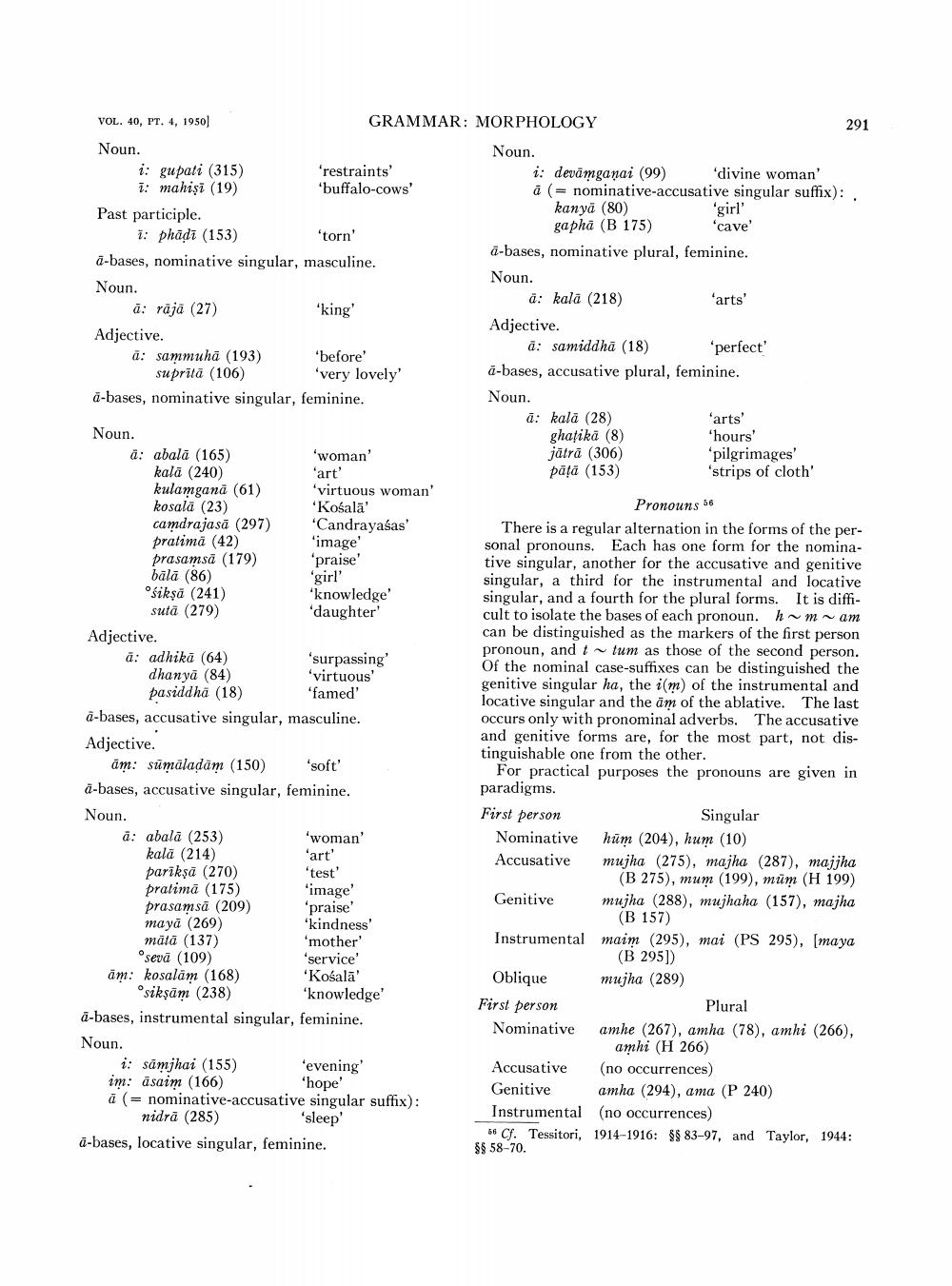________________
291
VOL. 40, PT. 4, 1950)
GRAMMAR: MORPHOLOGY Noun.
Noun. i: gupali (315) 'restraints'
i: devāmganai (99) "divine woman' ī: mahişi (19) 'buffalo-cows'
à (= nominative-accusative singular suffix): .
kanya (80) Past participle.
'girl'
gapha (B 175) "cave' i: phadi (153) 'torn
a-bases, nominative plural, feminine. à-bases, nominative singular, masculine.
Noun. Noun.
a: kala (218)
farts a: rājā (27) *king'
Adjective. Adjective.
ā: samiddhā (18) "perfect' a: sammuhā (193) before suprită (106) 'very lovely'
a-bases, accusative plural, feminine. a-bases, nominative singular, feminine.
Noun. ā: kala (28)
'arts' Noun.
ghaţikā (8)
'hours' a: abalā (165) 'woman'
jātrā (306)
'pilgrimages kalā (240) 'art'
pātā (153)
'strips of cloth kulamganā (61) 'virtuous woman' kosala (23) 'Kośalā
Pronouns 56 camdrajasā (297) 'Candrayaśas'
There is a regular alternation in the forms of the perpratima (42) 'image
sonal pronouns. Each has one form for the nominaprasamsā (179) praise
tive singular, another for the accusative and genitive bālā (86) 'girl'
singular, a third for the instrumental and locative Ośikṣā (241) *knowledge
singular, and a fourth for the plural forms. It is diffisuta (279) daughter
cult to isolate the bases of each pronoun. h m am Adjective.
can be distinguished as the markers of the first person
pronoun, and t tum as those of the second person. a: adhikā (64) 'surpassing
Of the nominal case-suffixes can be distinguished the dhanya (84) 'virtuous'
genitive singular ha, the i(m) of the instrumental and pasiddha (18) 'famed
locative singular and the ām of the ablative. The last à-bases, accusative singular, masculine.
occurs only with pronominal adverbs. The accusative
and genitive forms are, for the most part, not disAdjective.
tinguishable one from the other. ām: sumaladām (150) 'soft'
For practical purposes the pronouns are given in à-bases, accusative singular, feminine.
paradigms. Noun.
First person
Singular a: abala (253) 'woman'
Nominative hüm (204), hum (10) kalā (214) 'art'
Accusative mujha (275), majha (287), majiha parikşā (270) "test
(B 275), mum (199), müm (H 199) pratimā (175) 'image' prasamsā (209)
Genitive mujha (288), mujhaha (157), majha 'praise'
(B 157) mayā (269)
'kindness' mātā (137) *mother'
Instrumental maim (295), mai (PS 295), (maya sevā (109) 'service
(B 295]) ām: kosalām (168) 'Kośalā'
Oblique mujha (289) sikşām (238) 'knowledge First person
Plural à-bases, instrumental singular, feminine.
Nominative amhe (267), amha (78), amhi (266), Noun.
amhi (H 266) i: sāmjhai (155) 'evening'
Accusative (no occurrences) im: āsaim (166) "hope
Genitive amha (294), ama (P 240) (= nominative-accusative singular suffix): nidrā (285) 'sleep'
Instrumental (no occurrences)
*cf. Tessitori, 1914-1916: $8 83-97, and Taylor, 1944: à-bases, locative singular, feminine.
$8 58-70.




